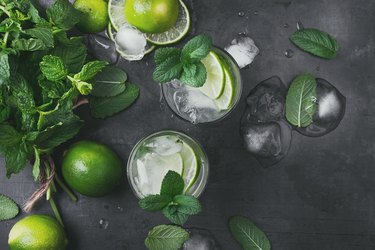
The morning after a long night out, it's not surprising to find yourself feeling bloated and puffy and dealing with a hangover. That's because alcohol's immediate impact on your body goes beyond just getting you drunk. Here's how to spot alcohol bloating and weight gain and how to avoid it.
Tip
Because plenty of alcoholic drinks are both calorie dense and filled with sugar, drinking a good amount of booze can leave you feeling bloated and unable to lose weight. Alcohol can also cause inflammation, dehydration and gastrointestinal issues, which can contribute to bloating and weight gain.
Video of the Day
Alcohol’s Effect on Your Stomach
Alcohol can have a huge impact on pretty much every organ and aspect of your body. As a central nervous system depressant, it gets absorbed into your stomach and small intestine once it's been consumed, then travels to your bloodstream, according to the Centers for Disease Control and Prevention. The liver is in charge of metabolizing alcohol, but it can only do so much.
Video of the Day
Alcohol causes inflammation, which, over the long run, can cause wear and tear on your body. Drinking too much over a period of months and years could even result in erosion of your stomach lining, a condition known as gastritis, according to Alcohol.org, an American Addiction Centers subsidiary. Alcoholic gastritis can lead not only to bloating, but also to nausea, vomiting and stomach pain.
Not only that, but drinking excessively may lead to chronic stomach problems as well. A study published in Clinical Liver Disease in 2015 found that chronic alcohol consumption was linked to changes in the gut microbiome that may be associated with increased inflammation and tissue damage, particularly in people with alcoholic fatty liver disease.
Additionally, a study published in PLOS One in October 2017 found that alcohol consumption was tied to a higher risk of three kinds of gastrointestinal cancers.
Gaining Weight From Drinking
Drinking frequently can also result in excess fat or weight gain. Often referred to as the "beer belly," your stomach after copious amounts of alcohol long-term will probably be bigger than if you weren't drinking.
This occurs because alcohol's high carbohydrate and sugar levels can trigger weight gain. In addition, you're more likely to eat heavier foods after a night out drinking and are less likely to feel full, requiring you to eat more than normal, according to the Better Health Channel. Finally, alcohol has to be burned first by your body, leaving the food you consume to be turned into fat tissue.
A study published in Current Obesity Reports in January 2015 found that people who drank heavily were more likely to be at risk for obesity and weight gain than people who drank lightly or moderately. So while it may not be necessary to cut out drinking altogether, you may need to stop binge-drinking entirely if you're hoping to lose weight, prevent alcohol bloating and start a healthier lifestyle.
Read more: Does Alcohol Raise Triglycerides?
How to Prevent Alcohol Bloating
The best way to avoid the negative effects of alcohol is to quit drinking entirely. But if you'd still like to enjoy a night out or two without the negative side effects like alcohol bloating or weight gain, you can tailor your evening to make sure you're staying healthy.
First, choose alcoholic options that contain fewer calories and sugars. Instead of going for sweet mixed drinks or beer, choose cleaner drinks like vodka and club soda, a gin martini with olives or tequila with lime. These will all contain about 100 calories per drink, as opposed to the 155 calories in beer.
Perhaps even more important is that you choose to drink lightly or moderately. According to the CDC, moderate alcohol consumption should be about one drink per day for women and two drinks per day for men. Try not to go beyond that on any given day, and keep your drinking nights down to once per week or every few weeks.
Finally, make sure you eat a full and well-balanced meal before you start drinking and drink water between drinks. This will help curb your alcohol-induced appetite later on, where your judgment will be impaired and you'll be more likely to crave high-carb or high-fat foods.
Choose a meal high in protein, vegetables and healthy carbohydrates like whole grains to keep you full when you start drinking. After each drink, consume a glass of water to stay hydrated. This way, you'll be less likely to wake up with bloating and a hangover.
- Centers for Disease Control and Prevention: "Alcohol and Public Health: "FAQ"
- Alcohol.org: "Treating the Effects of Alcoholic Gastritis"
- Better Health Channel: "Alcohol and Weight Gain"
- Current Obesity Reports: "Alcohol Consumption and Obesity: An Update"
- Centers for Disease Control and Prevention: "Moderate Drinking"
- Clinical Liver Disease: "The Gut Microbiome in NAFLD and ALD"
- PLOS One: "The Relationship Between Drinking Alcohol and Esophageal, Gastric or Colorectal Cancer: A Nationwide Population-Based Cohort Study of South Korea"